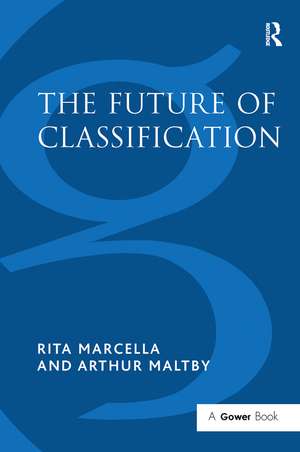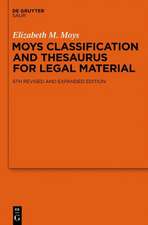The Future of Classification
Autor Rita Marcella, Arthur Maltbyen Limba Engleză Paperback – 15 dec 2017
| Toate formatele și edițiile | Preț | Express |
|---|---|---|
| Paperback (1) | 356.44 lei 6-8 săpt. | |
| Taylor & Francis – 15 dec 2017 | 356.44 lei 6-8 săpt. | |
| Hardback (1) | 998.56 lei 6-8 săpt. | |
| Taylor & Francis – 2 mar 2000 | 998.56 lei 6-8 săpt. |
Preț: 356.44 lei
Nou
Puncte Express: 535
Preț estimativ în valută:
68.21€ • 70.95$ • 56.31£
68.21€ • 70.95$ • 56.31£
Carte tipărită la comandă
Livrare economică 12-26 aprilie
Preluare comenzi: 021 569.72.76
Specificații
ISBN-13: 9780815346593
ISBN-10: 081534659X
Pagini: 160
Dimensiuni: 156 x 234 x 9 mm
Greutate: 0.45 kg
Ediția:1
Editura: Taylor & Francis
Colecția Routledge
Locul publicării:Oxford, United Kingdom
ISBN-10: 081534659X
Pagini: 160
Dimensiuni: 156 x 234 x 9 mm
Greutate: 0.45 kg
Ediția:1
Editura: Taylor & Francis
Colecția Routledge
Locul publicării:Oxford, United Kingdom
Cuprins
Contents: Introduction, Rita Marcella and Arthur Maltby; Do we still need classification?, Eric Hunter; Organizing knowledge: the need for system and unity, Arthur Maltby and Rita Marcella; Can classification yield an evaluative principle for information retrieval?, Julian Warner; Information technology and new directions, Robert Newton; Classification and the Internet, Alan MacLennan; The future of faceted classification, A.C. Foskett; The Dewey Decimal Classification in the twenty-first century, Joan S. Mitchell; UDC in the twenty-first century, I.C. McIlwaine; The Library of Congress Classification, Lois Mai Chan and Theodora L. Hodges; Sources for investigating the development of bibliographic classification, M.P. Satija; Index.
Notă biografică
Rita Marcella, co-author with Robert Newton of A New Manual of Classification, also published by Gower, is Reader and Deputy Head of the School of Information and Media at Robert Gordon University, Aberdeen, UK. She became a lecturer at the university after working as a cataloguer and classifier in an academic library. Now retired, Arthur Maltby was formerly, amongst other posts, head of a university information studies department and an adviser on education and libraries at the Scottish Office. He has written or edited nine other books and numerous articles on topics as diverse as information retrieval, Irish history and Shakespeare.
Recenzii
’It is encouraging to see a resurgence in the use of classification in organizing information resources...this book is an excellent introduction to its achievements in the past, and its potential for the future.’ Library Association Record ’As a collection of timely papers it is a truly valuable publication. It establishes without doubt that classification has and will continue to have a contribution to make to the bibliographic control of publications in all formats and in the contexts of both tangible and virtual collections... the book should be read by not only lecturers and students, but all those concerned with the display of collections by means of a subject criteria.’ Journal of Documentation ’... the book is extremely readable. It provides an excellent general introduction to contemporary issues in classification, and is worthwhile reading for anyone who wishes to familiarize him or herself with current developments. It is already on the classification module reading list for students at UCL, and is particularly appropriate for that purpose, covering as it does the major part of the post-graduate syllabus for classification. But it also serves as a guide to practitioners in the field, and to those non-specialists who wish to update their awareness of knowledge organization matters, or who wonder whether classification really is an out-dated method of handling information. The lists of references supporting each chapter are extensive, and again provide an excellent guide to the literature of the field...overall the book gives a very clear, comprehensive, and accurate picture of the state of play in the field of Classification. It confirms the notion that Classification does indeed have a future, and must be essential reading for all who have an interest in this subject.’ Library and Information Research News ’...an interesting and imperative evaluation of where and how classification fits into the changing world of information organ
Descriere
Provides an exploration of the future direction of classification, with contributions from a distinguished list of practitioners and theorists who have made a mark upon the field of classification.



